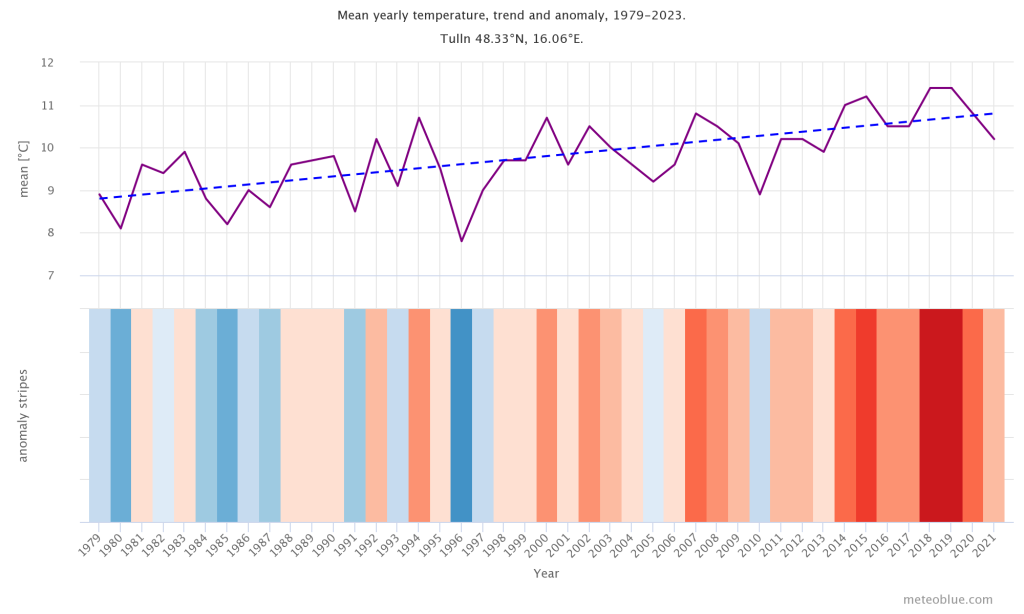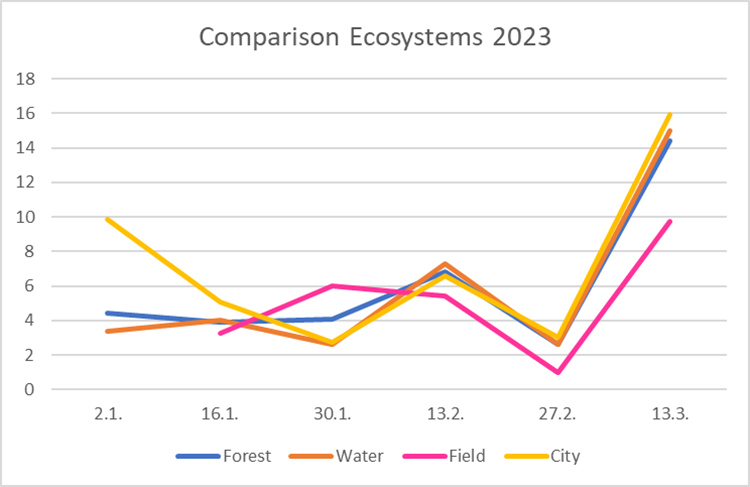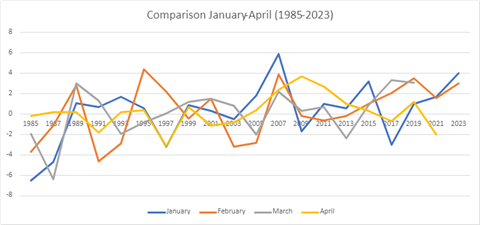Climate Detectives Projects 2022-2023
Project title: The Lower Austrian climate in transition
Team: Tullner Big Brain
Donaulände Tulln an der Donau Austria 6 Student’s age: 16-17 years old, 18-19 years old
What measurable changes can be recorded in relation to climate change in Lower Austrian ecosystems?
Welche messbaren Veränderungen können in Bezug auf den Klimawandel in niederösterreichischen Ökosystemen aufgezeichnet werden?

Prior to the commencement of the project, our team was acutely aware of the
profound impact that climate change has on our environment. The consequences of
global warming can be felt in a myriad of ways, and these effects are becoming
increasingly apparent. One example of this is the decline in snowfall during winter
months due to rising temperatures, which has a significant impact on various
industries such as tourism and agriculture. Additionally, the scarcity of water caused
by prolonged drought is particularly noticeable in rural areas, where farmers rely on
adequate rainfall to cultivate their crops.
Our team anticipated that the results of our measurements would show a clear
difference when compared to past data. We expected to see a notable increase in
temperatures and a decline in precipitation levels, both of which are indicators of
climate change. However, we also understood that the differences between various
locations would be starkly apparent. For instance, urban areas are often more
densely populated and have higher levels of air pollution, which can affect
temperature readings and other climate-related data.
Despite these challenges, our team remained committed to collecting accurate data
and analysing the impact of climate change on our environment. By doing so, we
hoped to raise awareness and encourage individuals and organizations to take action
to mitigate the effects of global warming.
Prior to the commencement of the project, our team was acutely aware of the
profound impact that climate change has on our environment. The consequences of
global warming can be felt in a myriad of ways, and these effects are becoming
increasingly apparent. One example of this is the decline in snowfall during winter
months due to rising temperatures, which has a significant impact on various
industries such as tourism and agriculture. Additionally, the scarcity of water caused
by prolonged drought is particularly noticeable in rural areas, where farmers rely on
adequate rainfall to cultivate their crops.
Our team anticipated that the results of our measurements would show a clear
difference when compared to past data. We expected to see a notable increase in
temperatures and a decline in precipitation levels, both of which are indicators of
climate change. However, we also understood that the differences between various
locations would be starkly apparent. For instance, urban areas are often more
densely populated and have higher levels of air pollution, which can affect
temperature readings and other climate-related data.
Despite these challenges, our team remained committed to collecting accurate data
and analysing the impact of climate change on our environment. By doing so, we
hoped to raise awareness and encourage individuals and organizations to take action
to mitigate the effects of global warming.

During the initial weeks of our project, we prioritised educating ourselves on the intricate subject of climate change. With our newfound expertise, we were determined to take tangible steps towards monitoring and measuring the impacts of climate change in our local region.
The data was collected at four different locations, each with unique characteristics. In addition to collecting data in the present, we also compared our results with past measurements. This allowed a more comprehensive overview of the extent of climate change in our area.
The ultimate goal was to provide factional evidence of the occurrence of climate change in our region. By gathering concrete data through regular measurements and comparison, we aimed substantiate the reality of this pressing issue and raise awareness about the urgent need for action to mitigate its impacts.
During the initial weeks of our project, we prioritised educationing ourselves on the intricate subject of climate change. With our newfound expertise, we were determined to take tangible steps towards monitor fling and measuring the impacts of climate change in our local region.
The data was collected at four different locations, each with unique characteristics. In addition to collecting data in the present, we also compared our results with past measurements. This allowed a more comprehensive overview of the extent of climate change in our area.
The ultimate goal was to provide factional evidence of the occurrence of climate change in our region. By gathering concrete data through regular measurements and comparison, we aimed substantiate the reality of this pressing issue and raise awareness about the urgent need for action to mitigate its impacts.

Climate change is one of the biggest challenges we face in our world. Its
consequences are significant in every corner of the globe. In Tullnerfeld the effects of climate change can already be felt in various
ways. Increasing temperatures, more frequent extreme weather events, and changes
in precipitation patterns are just a few examples of how climate change is already
having an influence on the region. To counteract these impacts, it is critical to
minimize greenhouse gas emissions and alleviate the effects of climate change.
There are various approaches that can be taken to reach this purpose.
Promoting renewable energy is a strategy for combating climate change.
This includes supporting the use of clean renewable energy sources like wind and
solar power, which create little to no greenhouse gases. Investing in renewable
energy infrastructure and technology can reduce our region’s dependence on fossil fuels.
fuels and contribute to a cleaner and more sustainable energy system.
Another critical strategy is to improve energy efficiency. Increasing building and
transportation energy efficiency can dramatically reduce energy usage and
associated greenhouse gas emissions. This can be accomplished by programs such
as renovating buildings with energy-efficient technologies, supporting public transit,
and encouraging cycling as an alternative to automobiles.
Another essential method to combating climate change is to promote sustainable
agriculture. Sustainable farming practices that promote soil health, conserve water,
and reduce greenhouse gas emissions can help to mitigate the effects of climate change.
change in the region. Encouraging farmers to adopt sustainable practices can also
improve local food security and resilience to climate change.
In conclusion, fighting climate change in Austria requires a comprehensive approach
that includes supporting renewable energy, enhancing energy efficiency,
encouraging sustainable agriculture, and raising awareness. By implementing these
measures, Austria can take an active role in mitigating the impacts of climate change
and creating a sustainable future.
Climate change is one of the biggest challenges we face in our world. Its
consequences are significant in every corner of the globe. In Tullnerfeld the effects of climate change can already be felt in various
ways. Increasing temperatures, more frequent extreme weather events, and changes
in precipitation patterns are just a few examples of how climate change is already
having an influence on the region. To counteract these impacts, it is critical to
minimize greenhouse gas emissions and alleviate the effects of climate change.
There are various approaches that can be taken to reach this purpose.
Promoting renewable energy is an strategy for combating climate change.
This includes supporting the use of clean renewable energy sources like wind and
solar power, which create little to no greenhouse gases. Investing in renewable
energy infrastructure and technology can reduce our region’s dependence on fossil
fuels and contribute to a cleaner and more sustainable energy system.
Another critical strategy is to improve energy efficiency. Increasing building and
transportation energy efficiency can dramatically reduce energy usage and
associated greenhouse gas emissions. This can be accomplished by programs such
as renovating buildings with energy-efficient technologies, supporting public transit,
and encouraging cycling as an alternative to automobiles.
Another essential method to combating climate change is to promote sustainable
agriculture. Sustainable farming practices that promote soil health, conserve water,
and reduce greenhouse gas emissions can help to mitigate the effects of climate
change in the region. Encouraging farmers to adopt sustainable practices can also
improve local food security and resilience to climate change.
In conclusion, fighting climate change in Austria requires a comprehensive approach
that includes supporting renewable energy, enhancing energy efficiency,
encouraging sustainable agriculture, and raising awareness. By implementing these
measures, Austria can take an active role in mitigating the impacts of climate change
and creating a sustainable future.
This project was automatically translated into English.
Projects are created by the teams and they take the full responsibility of the shared data.
← All projects







